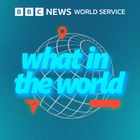
What in the World
Aug 30, 2024
Pavel Durov’s arrest could impact free speech, and the war between Russia and Ukraine.
Over the last few years the social media and messaging app Telegram has become increasingly popular. It’s different from other apps, like WhatsApp and Facebook, partly because it allows you to create massive groups, of up to 200,000 people. But the app has also faced criticism relating to disinformation, and the sharing of conspiracist, neo-Nazi, paedophilic, or terror-related content.
On Wednesday Pavel Durov, the founder and CEO of Telegram, was placed under formal investigation in France as part of a probe into organised crime on the app. BBC tech reporter Graham Fraser tells us what we need to know about Telegram, and this investigation.
Telegram has often been used by pro-democracy protesters, including in Hong Kong. The BBC’s Fan Wang explains.
And there has been a massive reaction to Durov’s arrest in Russia. The BBC’s Karine Mirumyan tells us why the Russian military, and government, use the app - and whether this arrest could impact the war in Ukraine.
Instagram: @bbcwhatintheworld Email: [email protected] WhatsApp: +44 0330 12 33 22 6 Presenter: Alex Rhodes Producers: Mora Morrison and Zofia Louise Editor: Verity Wilde

